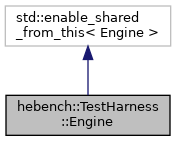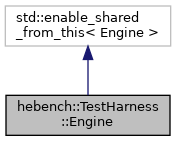#include <hebench_engine.h>


Public Types | |
| typedef std::shared_ptr< Engine > | Ptr |
Public Member Functions | |
| std::string | getErrorDescription (hebench::APIBridge::ErrorCode err_code) const |
| void | validateRetCode (hebench::APIBridge::ErrorCode err_code, bool last_error=true) const |
| virtual | ~Engine () |
| std::string | getSchemeName (hebench::APIBridge::Scheme s) const |
| std::string | getSecurityName (hebench::APIBridge::Scheme s, hebench::APIBridge::Security sec) const |
| std::string | getExtraDescription (hebench::APIBridge::Handle h_bench_desc, const std::vector< hebench::APIBridge::WorkloadParam > &w_params) const |
| std::size_t | countBenchmarks () const |
| Number of benchmarks for which backend is registered to perform. More... | |
| IBenchmark::Ptr | createBenchmark (IBenchmarkDescriptor::DescriptionToken::Ptr p_token, hebench::Utilities::TimingReportEx &out_report) |
| Creates the the benchmark workload represented by the specified token. More... | |
| IBenchmarkDescriptor::DescriptionToken::Ptr | describeBenchmark (std::size_t index, const BenchmarkDescription::Configuration &config) const |
| Describes a benchmark workload that matches the specified description from the benchmarks registered by the backend. More... | |
| std::vector< std::vector< hebench::APIBridge::WorkloadParam > > | getDefaultWorkloadParams (std::size_t index) const |
| Retrieves the list of default parameters for a workload as specified by the backend. More... | |
| std::string | getLastErrorDescription () const |
| const hebench::APIBridge::Handle & | handle () const |
Static Public Member Functions | |
| static void | completeBenchmarkDescriptor (hebench::TestHarness::BenchmarkDescription::Backend &backend_description, const hebench::APIBridge::BenchmarkDescriptor &completed_descriptor) |
Grants a guarded write access to hebench::TestHarness::BenchmarkDescription::Backend::m_descriptor::cat_params. More... | |
| static Engine::Ptr | create (const std::vector< std::int8_t > &data) |
| Creates a new backend engine. More... | |
Detailed Description
Definition at line 22 of file hebench_engine.h.
Member Typedef Documentation
◆ Ptr
| typedef std::shared_ptr<Engine> hebench::TestHarness::Engine::Ptr |
Definition at line 31 of file hebench_engine.h.
Constructor & Destructor Documentation
◆ ~Engine()
|
virtual |
Definition at line 106 of file hebench_engine.cpp.
Member Function Documentation
◆ completeBenchmarkDescriptor()
|
static |
Grants a guarded write access to hebench::TestHarness::BenchmarkDescription::Backend::m_descriptor::cat_params.
- Parameters
-
backend_description Backend description to complete. All members of hebench::TestHarness::BenchmarkDescription::Backend::descriptormust be set, except for, perhaps, cat_params which will be overwriten in this call.[in] completed_descriptor Descriptor from which to copy the cat_params. All other fields must match that ofbackend_description.descriptor.
- Exceptions
-
Instance of std::exceptionif input and output descriptors are incompatible.
If both backend descriptors are compatible, this method copies the category parameters from completed_descriptor to backend_descriptor .
Definition at line 198 of file hebench_engine.cpp.
◆ countBenchmarks()
|
inline |
Number of benchmarks for which backend is registered to perform.
Definition at line 71 of file hebench_engine.h.
◆ create()
|
static |
Creates a new backend engine.
- Parameters
-
[in] data External data to pass to the backend engine for initialization, if any. Otherwise, empty array.
- Returns
- A pointer to the engine wrapper.
This method calls APIBridge::initEngine() passing the specified data to create and initialize the loaded backend engine.
Definition at line 58 of file hebench_engine.cpp.
◆ createBenchmark()
| IBenchmark::Ptr hebench::TestHarness::Engine::createBenchmark | ( | IBenchmarkDescriptor::DescriptionToken::Ptr | p_token, |
| hebench::Utilities::TimingReportEx & | out_report | ||
| ) |
Creates the the benchmark workload represented by the specified token.
- Parameters
-
[in] p_token Token of the described benchmark workload as returned by describeBenchmark(). Cannot be null.
- Returns
- Smart pointer to the created benchmark workload.
- Exceptions
-
std::logic_error when creating a new benchmark without destroying previously existing benchmark. std::invalid_argument on invalid p_token.
As long as the returned benchmark exists, this engine cannot be destroyed. This method ensures that only one benchmark from this engine exists at a time.
The returned object is to be used by Test Harness to execute the benchmark.
Definition at line 167 of file hebench_engine.cpp.
◆ describeBenchmark()
| IBenchmarkDescriptor::DescriptionToken::Ptr hebench::TestHarness::Engine::describeBenchmark | ( | std::size_t | index, |
| const BenchmarkDescription::Configuration & | config | ||
| ) | const |
Describes a benchmark workload that matches the specified description from the benchmarks registered by the backend.
- Parameters
-
[in] index Index of the registered backend benchmark description for which to create a benchmark workload. [in] config Configuration for the benchmark to describe. See details.
- Returns
- A token describing the benchmark to be executed given the workload and parameters.
- Exceptions
-
Instance of std::exception on errors.
The token returned by this method is to be used in a call to createBenchmark() to instantiate the actual benchmark to run.
The token returned by this method contains the correct full description for the benchmark.
For parameter config only the workload parameters are required to be correct. The returned token will contain the information passed on the other fields corrected to the number of operation parameters for the workload.
Definition at line 177 of file hebench_engine.cpp.
◆ getDefaultWorkloadParams()
| std::vector< std::vector< hebench::APIBridge::WorkloadParam > > hebench::TestHarness::Engine::getDefaultWorkloadParams | ( | std::size_t | index | ) | const |
Retrieves the list of default parameters for a workload as specified by the backend.
- Parameters
-
[in] index Index of the benchmark to query for default parameters.
- Returns
- A vector with the list of default arguments for the parameters of the workload. Vector is empty if workload does not support parameters.
Definition at line 215 of file hebench_engine.cpp.
◆ getErrorDescription()
| std::string hebench::TestHarness::Engine::getErrorDescription | ( | hebench::APIBridge::ErrorCode | err_code | ) | const |
Definition at line 17 of file hebench_engine.cpp.
◆ getExtraDescription()
| std::string hebench::TestHarness::Engine::getExtraDescription | ( | hebench::APIBridge::Handle | h_bench_desc, |
| const std::vector< hebench::APIBridge::WorkloadParam > & | w_params | ||
| ) | const |
Definition at line 149 of file hebench_engine.cpp.
◆ getLastErrorDescription()
| std::string hebench::TestHarness::Engine::getLastErrorDescription | ( | ) | const |
Definition at line 29 of file hebench_engine.cpp.
◆ getSchemeName()
| std::string hebench::TestHarness::Engine::getSchemeName | ( | hebench::APIBridge::Scheme | s | ) | const |
Definition at line 115 of file hebench_engine.cpp.
◆ getSecurityName()
| std::string hebench::TestHarness::Engine::getSecurityName | ( | hebench::APIBridge::Scheme | s, |
| hebench::APIBridge::Security | sec | ||
| ) | const |
Definition at line 129 of file hebench_engine.cpp.
◆ handle()
|
inline |
Definition at line 122 of file hebench_engine.h.
◆ validateRetCode()
| void hebench::TestHarness::Engine::validateRetCode | ( | hebench::APIBridge::ErrorCode | err_code, |
| bool | last_error = true |
||
| ) | const |
Definition at line 41 of file hebench_engine.cpp.
The documentation for this class was generated from the following files: